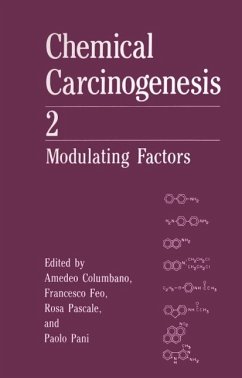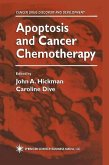Chemical Carcinogenesis 2 (eBook, PDF)
Modulating Factors
Redaktion: Columbano, A.; Pascale, R.; Pani, P.; Feo, F.


Alle Infos zum eBook verschenken

Chemical Carcinogenesis 2 (eBook, PDF)
Modulating Factors
Redaktion: Columbano, A.; Pascale, R.; Pani, P.; Feo, F.
- Format: PDF
- Merkliste
- Auf die Merkliste
- Bewerten Bewerten
- Teilen
- Produkt teilen
- Produkterinnerung
- Produkterinnerung

Hier können Sie sich einloggen

Bitte loggen Sie sich zunächst in Ihr Kundenkonto ein oder registrieren Sie sich bei bücher.de, um das eBook-Abo tolino select nutzen zu können.
"chemical carcinogenesis" is the general title of the series of international meetings which are held, biannually, in sardinia (Italy) since 1981. Despite the generality of the title, the main effort of the scientific Committee has been to pursue a coherent line around one of the most distinguishing features of carcinogenesis: the "multifasic" development of the process. Given that many chemical compounds are known to cause "experimental cancer", many questions still remain unresolved or are given too simplistic answers. The very first question concerning the interaction between the chemical…mehr
- Geräte: PC
- ohne Kopierschutz
- eBook Hilfe
- Größe: 66.01MB
![Experimental Hepatocarcinogenesis (eBook, PDF) Experimental Hepatocarcinogenesis (eBook, PDF)]() Experimental Hepatocarcinogenesis (eBook, PDF)40,95 €
Experimental Hepatocarcinogenesis (eBook, PDF)40,95 €![DNA Repair in Cancer Therapy (eBook, PDF) DNA Repair in Cancer Therapy (eBook, PDF)]() DNA Repair in Cancer Therapy (eBook, PDF)113,95 €
DNA Repair in Cancer Therapy (eBook, PDF)113,95 €![Apoptosis in Carcinogenesis and Chemotherapy (eBook, PDF) Apoptosis in Carcinogenesis and Chemotherapy (eBook, PDF)]() Apoptosis in Carcinogenesis and Chemotherapy (eBook, PDF)161,95 €
Apoptosis in Carcinogenesis and Chemotherapy (eBook, PDF)161,95 €![Apoptosis and Cancer Chemotherapy (eBook, PDF) Apoptosis and Cancer Chemotherapy (eBook, PDF)]() Apoptosis and Cancer Chemotherapy (eBook, PDF)81,95 €
Apoptosis and Cancer Chemotherapy (eBook, PDF)81,95 €![Biochemistry of Chemical Carcinogenesis (eBook, PDF) Biochemistry of Chemical Carcinogenesis (eBook, PDF)]() R. Colin GarnerBiochemistry of Chemical Carcinogenesis (eBook, PDF)40,95 €
R. Colin GarnerBiochemistry of Chemical Carcinogenesis (eBook, PDF)40,95 €![Apoptosis (eBook, PDF) Apoptosis (eBook, PDF)]() Apoptosis (eBook, PDF)113,95 €
Apoptosis (eBook, PDF)113,95 €![Molecular Mechanisms of Basal Cell and Squamous Cell Carcinomas (eBook, PDF) Molecular Mechanisms of Basal Cell and Squamous Cell Carcinomas (eBook, PDF)]() Molecular Mechanisms of Basal Cell and Squamous Cell Carcinomas (eBook, PDF)113,95 €
Molecular Mechanisms of Basal Cell and Squamous Cell Carcinomas (eBook, PDF)113,95 €-
-
-
Dieser Download kann aus rechtlichen Gründen nur mit Rechnungsadresse in A, B, BG, CY, CZ, D, DK, EW, E, FIN, F, GR, HR, H, IRL, I, LT, L, LR, M, NL, PL, P, R, S, SLO, SK ausgeliefert werden.
- Produktdetails
- Verlag: Springer US
- Seitenzahl: 653
- Erscheinungstermin: 6. Dezember 2012
- Englisch
- ISBN-13: 9781461536949
- Artikelnr.: 43982816
- Verlag: Springer US
- Seitenzahl: 653
- Erscheinungstermin: 6. Dezember 2012
- Englisch
- ISBN-13: 9781461536949
- Artikelnr.: 43982816
- Herstellerkennzeichnung Die Herstellerinformationen sind derzeit nicht verfügbar.







